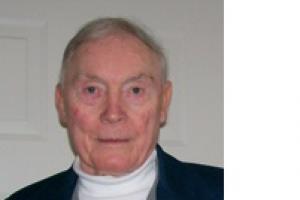
Born in Neidpath, Saskatchewan, in 1927, Frank Karwandy came from a family with roots in the Austro-Hungarian Empire. Keen on education, his father served as a councillor and reeve in the Municipality of Lawtonia. Frank was educated locally in one and two room schools, in high school in Herbert, Saskatchewan, and came to UBC in 1947 to study History, English, and French. He entered UBC Law School in 1949, when he was twenty-one.
He recalls his years at UBC law school with affection. "Four of us banded together," he says. "Bill Quinn, Roland Barnes, Al MacDonnell, and myself. Law classes were in the morning, and we met in the afternoons and talked about our classes and cases. We'd say, 'What did you think?' and, 'How important is such-and-such a case?" The four of us stayed together for the three years of law school. Law School was difficult! But not so much academically: the main problem was the amount of work and remembering case names. There were so many cases! The library was quiet and I used to stay there until 9 at night. Of the four of us, Bill, who was also from Saskatchewan, moved to Alberta and practiced law there; Roland went into the Royal Canadian Navy legal branch; and Al, who was from Vernon, practiced in Prince Rupert and became a judge in the Supreme Court of British Columbia. I was in the same class as Mary Southin and Patricia Proudfoot [nee Fahlman], both of whom became well-known judges in British Columbia."
Karwandy enrolled in the Canadian Officers" Training Corps (COTC) at UBC in 1950, spent the summers training, and enlisted in the Regular Army prior to the third year of law school. Upon graduation, he was posted to The Lord Strathcona's Horse (Royal Canadians) in Calgary. In 1955, he gained admission to the BC Law Society and obtained his articles with the Burnaby law firm of Hean, Wylie and Hyde. "Burnaby was being developed so it was primarily real estate," he recalls. "I did a lot of title searches!"
His combination of legal and military training made Karwandy an ideal candidate for the Office of the Judge Advocate General (JAG), which he joined in 1956. This office provides legal advice to the senior and commanding officers of the Canadian Forces. JAG officers also serve as prosecuting and defending officers at General Courts Martial, which deal with serious military offences, and at Disciplinary Courts Martial, which deal with less serious military offences. Additionally, legal officers provide a limited legal aid service to all members of the Forces involving such matters as marital problems and landlord and tenant issues. Karwandy was stationed in Canada and in Germany and saw service in Cyprus and France. In 1982, he was promoted to Brigadier General and appointed Judge Advocate General of the Canadian Forces. He retired from the Forces in 1987 and now lives in Surrey, BC, with his wife Esther.
For further details, see R. Arthur McDonald, Canada's Military Lawyers (Ottawa: 2002).
For more, listen to Allard Law History Project Interview with Frank Karwandy.
First published on June 18, 2016.